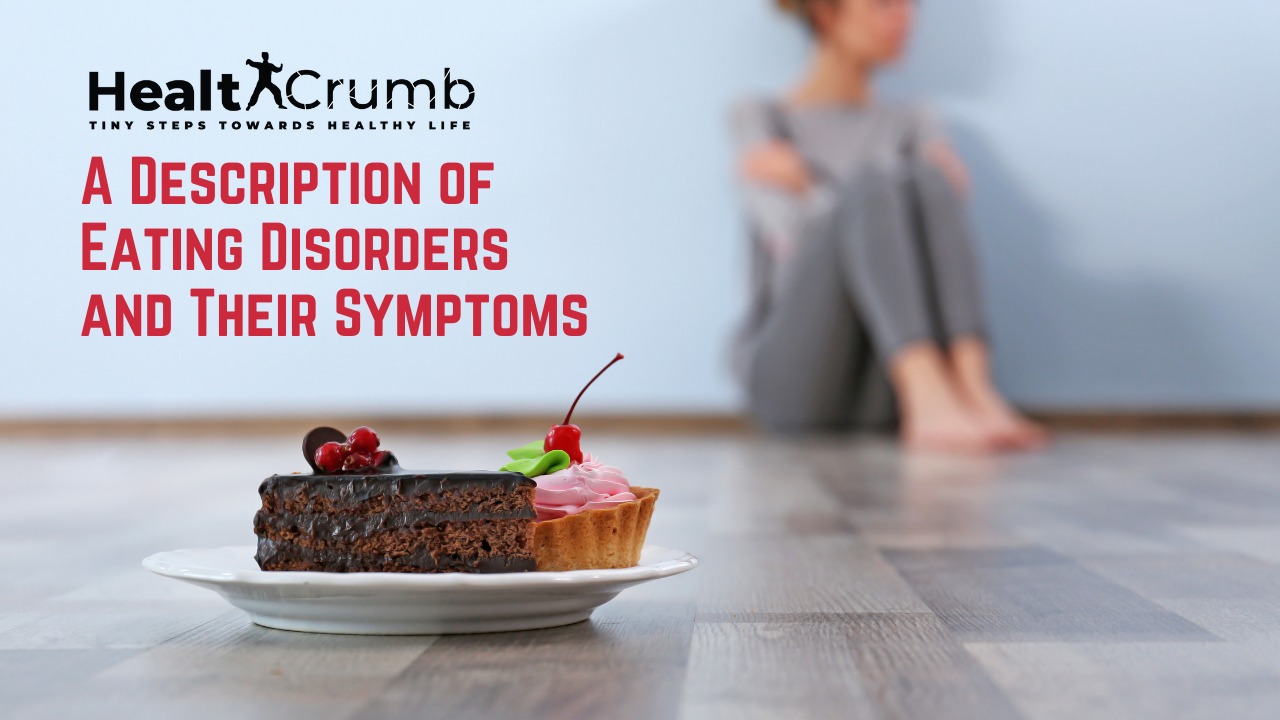Eating disorders are a serious mental illness that affects more than two million people in the U.S. alone. It can involve a wide range of behaviors, including intense dieting, binge-eating, and purging. People with symptoms of eating disorders often have a distorted view of their body and eat in an attempt to regulate their feelings. They may also experience intense cravings for food, which can become so strong that they feel like they have to have food even when it’s not appropriate or healthy.
They can also lead to extreme weight loss or gain, as well as health problems like anemia and heart disease. It can be extremely difficult to diagnose, but if you or someone you know is struggling with symptoms of eating disorders, there are some warning signs to watch for.
In this article, we’ll explore what eating disorders are, symptoms of eating disorders, as well as provide resources for those who want to get help.
Symptoms of Eating Disorders
Eating disorders are a group of mental illnesses that involve abnormal eating habits and behaviors. Eating disorders can be difficult to detect and diagnose, but their symptoms are often similar.
This disorder can lead to serious health problems, including an increased risk of developing obesity, heart disease, and diabetes. They can also lead to social withdrawal, emotional problems, and a decreased quality of life.
Symptoms can include an excessive focus on food, feeling uncontrollably hungry, eating too much or too little, fasting or binging, and extreme changes in weight or body shape. Eating disorders can affect people of any age, but they are most common in young adults and adolescents.
People with symptoms of eating disorders may also have problems with self-esteem. They may feel like they are not good enough or that they are not in control of their own bodies.
Combined, these factors can lead to an obsessive interest in food and a strong desire to lose weight or control their body shape. There is no one-size-fits-all approach to treating symptoms of eating disorders, but various interventions can be helpful. These may include psychotherapy, diet and nutrition counseling, or physical activity programs.
If you’re concerned that someone may have symptoms of eating disorders, here are some signs to watch for:
- Extreme weight or body size changes, especially in men or women who haven’t had a change in their nutrition or exercise habits
- An intense fear of being fat or gaining weight
- Unusual patterns of food consumption, such as eating only certain types of foods, refusing to eat altogether, or bingeing and purging
- Repeated comments about how bad one feels about their body or how one’s stomach hurts after eating
- Restlessness and indecision when it comes to food, eating too much at once, or not caring what they eat
- Extreme mood swings, including feelings of extreme happiness or sadness, irritability, or fatigue
- Difficulty concentrating, forgetting things, or making decisions
- Severe anxiety or depression
If you are concerned that you have symptoms of eating disorders, talk to your doctor. There is no specific test that can confirm whether you have this disorder, but your doctor may be able to diagnose it based on your symptoms.
Treatment for Eating Disorders
There is no single, effective treatment for eating disorders. Treatment typically involves a combination of individual therapy, group therapy, and medication.
- Individual therapy is typically the first step in treatment for eating disorders. This type of therapy helps patients learn how to manage their emotions and thoughts related to food and eating.
- Group therapy is also commonly used in the treatment to cure symptoms of eating disorders. Group therapy allows patients to share their experiences and feelings with others who may be able to provide support.
- Medication can be helpful in the treatment of eating disorders. It can help to reduce symptoms of an eating disorder, such as an obsession with food or a fear of weight gain.
Most people with an eating disorder need treatment that combines individual therapy, group therapy, and medication.
Treatment will vary based on the individual’s needs. If you are concerned about your own eating habits, it is important to speak with a doctor or therapist. They can help you determine if you need treatment for an eating disorder and provide resources to get started. There is no one approach that is right for everyone. You will need to find a treatment program that meets your specific needs for symptoms of eating disorders.
Eating disorders cannot be cured by a single treatment, but treatment can help individuals manage their symptoms and live a healthy lifestyle.
However, some general tips for treating symptoms of eating disorders include:
- Get professional help – A diagnosis of an eating disorder can be incredibly challenging and scary, and may necessitate the help of a mental health professional. A therapist can help you identify and overcome any underlying issues that may be contributing to your eating disorder, and provide support during the healing process.
- Try cognitive behavioral therapy (CBT) – CBT is a type of therapy that helps people change their thoughts and behaviours related to their anxiety or mood disorders. It has been shown to be effective in treating eating disorders, and can help you learn how to manage your symptoms in a healthy way.
- Engage in regular physical activity – Regular exercise has numerous benefits for both mental and physical health, including reducing stress levels and improving moods. Additionally, exercise can help reduce overeating and weight gain, which are common symptoms of eating disorders.
- Avoid social media and other forms of media that may trigger your eating disorder symptoms – Some research suggests that exposure to images and messages that promote an unhealthy body image can be harmful to people with eating disorders. If you find that you are struggling to stop using social media or watching certain types of media, speak with a friend or family member about how they can help support your recovery.
Make healthy dietary changes eating disorders are often linked with unhealthy diets, which can contribute to weight gain, body image dissatisfaction, and other associated health problems. Change your diet to that focus on whole, unprocessed foods, and limit your intake of sugar, processed foods, and unhealthy fats.
If you or someone you know is struggling with symptoms of eating disorders, please don’t hesitate to reach out for help. There are many programs and resources available to help people with eating disorders recover.
Causes of Eating Disorders
Eating disorders can be caused by a variety of factors, including genetics and lifestyle choices. However, some people develop eating disorders because of psychological or emotional problems. Some people with symptoms of eating disorders may have trouble regulating their emotions. They may feel frustrated and overwhelmed when they can’t control their food intake or body weight.
Others may have difficulty coping with stress and anxiety. These problems can lead to an obsessive interest in food and a strong desire to lose weight or control their body shape.
Some people with eating disorders may also have an underlying mental health condition, such as depression or an anxiety disorder.
There are many possible causes for eating disorders, but a few common ones include psychological problems like anxiety and depression, substance abuse, and trauma. Some people develop symptoms of eating disorders after experiencing an eating disorder in their family. There is no one specific cause of eating disorders, but they are often linked to problems with self-esteem, body image, and stress. Eating disorders can also be caused by genetics, psychiatric disorders, and drug abuse.
People with eating disorders may also have problems with self-esteem. They may feel like they are not good enough or that they are not in control of their own bodies. Combined, these factors can lead to an obsessive interest in food and a strong desire to lose weight or control their body shape.
There is no one specific cause of eating disorders, but they are often linked to problems with self-esteem, body image, and stress. Eating disorders are serious mental illnesses that can be difficult to treat. There are many resources available to help you, including hotlines, support groups, and online resources.
Treatment for eating disorders typically involves therapy and medications. Therapy can help people with eating disorders understand their feelings and behaviors. Medications may be used to help control the symptoms of an eating disorder. Treatment may also involve dietary changes, weight loss, and exercise.
Conclusion
Eating disorders are a serious mental illnesses that can involve a wide range of behaviors, including intense dieting, binge-eating, and purging. If you or someone you know is struggling with an eating disorder, be sure to watch for warning signs like an excessive focus on food, feeling uncontrollably hungry, eating too much or too little, fasting or binging, and extreme changes in weight or body shape.
There are many symptoms of eating disorders, and each one has its own set of symptoms. If you think that you or someone you know may be struggling with symptoms of eating disorders, it is important to seek help. There is no one-size-fits-all approach to treating eating disorders, but various interventions can be helpful. These may include psychotherapy, diet and nutrition counseling, or physical activity programs.
There are numerous resources available to those who need them, including support groups and therapists. Remember: there is always hope, and getting the help that you need will make a big difference in your life.



